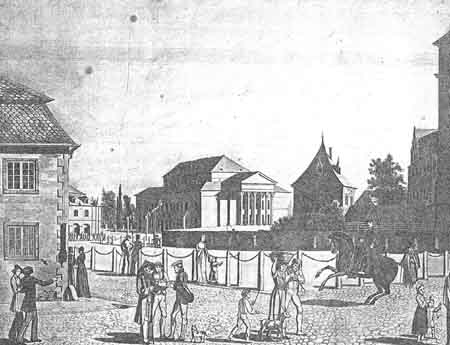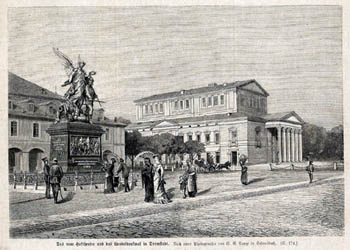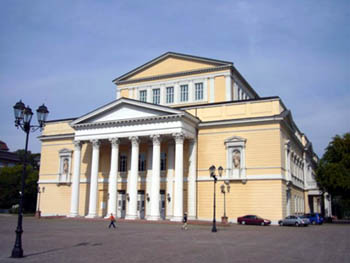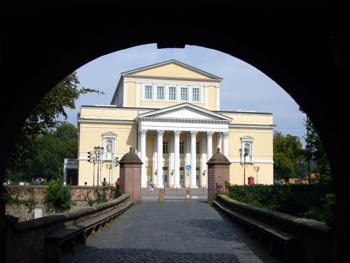
![]()
This page is also available in French
![]()
It was only in May 1843 that Berlioz visited Darmstadt during his first trip to Germany – but the seeds that led to that visit were planted many years before.
While a student in Paris in the 1820s Berlioz met a number of German musicians; they helped to introduce him to the German musical scene which was to play such a significant part later in his career. Among the earliest of these were the Schlösser brothers, Theodor and Ludwig. Theodor Schlösser, a pianist, studied like many German musicians at the time at the Conservatoire in Paris with Lesueur, and seems to have met Berlioz around 1822 or 1823. In a letter of this period to his sister Adèle in La Côte Saint-André Berlioz mentions an evening at the Lesueurs (Correspondance Générale no. 20; hereafter shortened to CG):
[…] Three weeks ago I had to go to a ball, as I was one of the partners of these ladies [the three daughters of Lesueur]. You can imagine how bored I was. So on arriving, M. Schlösser and myself danced the first contredanse with the Lesueur ladies […]
A letter to his other sister Nancy several years later (1 November 1828) gives a lively account of his meeting with the younger brother, Ludwig Schlösser, with whom Berlioz was to become close (CG no. 100):
[…] I have become friends with a young German [sc. Ludwig Schlösser] who knew Weber very well; recently we spent five hours in a row in front of a piano playing to M. Lesueur pieces from the Freischütz, Oberon and Euryanthe of which he had no knowledge at all. We were performing everything from memory, with Schlösser accompanying his own singing of the pieces in German and myself singing those for which there is a French translation. M. Lesueur was in the seventh heaven; these new forms made him experience unknown feelings.
My relationship with this young man has an unusual origin. I was at M. Lesueur’s the day he introduced himself for the first time with a letter of recommendation; this letter was from his elder brother who, on his way through Paris some five years ago had taken a few lessons in composition from M. Lesueur, and whom I had met at the time. A few days later we were together and the conversation came round to modern composers. He was visibly trying to avoid giving his view of Rossini, whose fervent admirer he, without any reason, thought I was. For the same reason that he was not expressing himself openly I was under the impression that he did not want to admit to me that he was a devotee of Rossini, and for half an hour we were resorting to every verbal subterfuge to hide an opinion which we both thought would have been improper to express in all its crudeness. Finally I said to him: « What do you think of Le Comte Ory? – Well, it is not… – Outstanding, you mean? – On the contrary, it is dreadful. – So you are not an admirer of Rossini? Me, heaven forbid! How could an admirer of Weber, of Beethoven and of Spontini be a devotee of Rossini? If I may say so, that is what I find surprising in your case. – Well then, I said to him, if Rossini had no other supporter than myself… Where did you get this idea?… » At that point we could not contain our laughter at all our verbal contortions. The conversation then got animated, he knows English, admires Shakespeare, has met Goethe while in Weimar, detests the absurdities of the Italian school, abhors commonplaces whether in music or literature: that was ten times more than was necessary to bring the two of us together. On top of all this he is very witty and cultured, has studied with great success a whole range of subjects and speaks French like us. Nothing annoys me more than to see foreigners speaking our language so well, when we can hardly say a word of theirs. […]
Schlösser has told me some details about Goethe which are delightful; this old man still has as much fire as a thirty-year old! He welcomes visitors with a courtesy and simplicity which must be enchanting with such a man; his prevailing mood is one of gentle cheerfulness which resembles melancholy. He has come to terms with the passing of his two most illustrious friends, Schiller and Beethoven, with more courage than one could imagine. […]
The following month Nancy in reply gave her seal of approval to Berlioz’s new friend (CG no. 105; 7 December 1828):
[…] I read with the greatest interest the story of your unusual relationship with this young German, this devoted admirer of all the composers and writers who excite you, and I am very pleased with what you say about his personal qualities; nothing flatters me like seeing that you have so much common ground with young men of distinction […]
Schlösser was still in Paris in 1829 (CG no. 123). At some point later he left and eventually settled in Darmstadt where he spent his entire career; at the time of Berlioz’s visit in May 1843 he was leader of the orchestra. It is not till Berlioz started his travels in Germany in the 1840s that there is evidence of renewed contacts with Schlösser, though in a letter dated 1 January 1832 to Ferdinand Hiller Berlioz casually mentions his intention to go to Germany and visit among other friends Theodor Schlösser (CG no. 256, from Rome).
Darmstadt was not at the time one of Germany’s leading musical cities, and is not listed by Berlioz among the places he intended to visit at the start of his first trip (CG no. 791, 9 December 1842), nor is it mentioned in his extant letters during that trip until he arrived there in May 1843. Berlioz’s stop in Darmstadt took place in fact at the very end of his first German tour, after his concert on 6 May in Hanover and before the return to Paris, and was probably arranged quickly as an afterthought. It is possible that Ludwig Schlösser played some part in this. In the tenth letter on his first trip to Germany (originally published in the Journal des Débats on 9 January 1844, then later reproduced in the Memoirs), Berlioz also mentions that he had a letter of introduction from Rothschild in Frankfurt for Prince Emile, who in turn introduced him to the Grand Duke of Darmstadt. On 17 May Berlioz wrote from Darmstadt to Wilhelm Speyer in Frankfurt (CG no. 834):
[…] I am giving my concert here next Tuesday 22 May [23 in reality]; the Grand Duke has made available to me the theatre and the orchestra. In addition Reichel the bass singer who has such a remarkable voice will be singing. Would you be so kind as to announce it in the papers in Frankfurt?
The programme will consist of the following:
Excerpts from the choral symphony Romeo and Juliet.
Le Cinq mai or the death of Emperor Napoleon, a cantata for bass voice with chorus.
Overture King Lear.
Songs for soprano and orchestra.
Harold, a symphony in 4 parts with a principal viola.
Invitation to the Dance, a rondo for piano by C. M. Weber orchestrated for full orchestra by M. Berlioz.
NB With the exception of the last piece all the items on the programme are by M. Berlioz – […]
Another letter to an anonymous journalist (CG no. 835bis, in vol. VIII) adds the detail, not mentioned in the Memoirs, that the songs for soprano and orchestra were to be sung by Marie Recio (cf. also CG no. 836 on her presence in Darmstadt). The concert took place in the theatre. Berlioz was generally pleased with the result, as he relates in the Débats and again in the Memoirs:
The concert was quickly organised and the orchestra, far from being reluctant to rehearse, would have liked me to devote an extra week to studying the music. We did five rehearsals. Everything went well, with the exception of the double chorus of young Capulets returning from the feast at the start of the love scene in Romeo and Juliet. The performance of this piece was a veritable rout for the chorus; the tenors of the second chorus fell in pitch by nearly a semitone, and those of the first chorus missed their entry on the return of the theme. The chorus master was furious as you can imagine, as for a whole week he had taken infinite trouble to prepare the chorus.
The Darmstadt orchestra is somewhat larger than that of Hanover; unusually it has an excellent ophicleid. The harp part is entrusted to a painter, who for all his efforts and good intentions is never sure of giving much colour to his playing. The remaining orchestral players are of a good standard and very well disposed. Among them is a remarkable virtuoso, of the name of Müller […] His almost gigantic stature allows him to play a true four-stringed double-bass with extraordinary facility. Without trying to play as he might unnecessarily difficult scales and arpeggios which would have a grotesque effect, he makes his enormous instrument sing with grave nobility, and knows how to draw from it sounds of great beauty which he colours with great artistry and sensitivity. […]
The Kapellmeister [Johann Wilhelm] Mangold, a talented and admirable man, received most of his musical education in Paris, where he was among the best pupils of Reicha. For me he was therefore a fellow-student, and treated me as such. As for Schlösser the leader of the orchestra whom I have mentioned, he proved such a good friend and assisted me with such devotion that I am unable to write as I ought about those compositions of his that I was allowed to see; I would be thought to be rewarding his hospitality, when all I would be doing is giving him justice. […]
Back in Paris Berlioz wrote on 10 June to Schlösser, himself in Paris at the time, to discuss the possibility of concerts in Holland on the pattern of those he had given in Germany, though nothing came of this (CG no. 840). The letter makes no mention of the recent visit to Darmstadt, though Berlioz had evidently not forgotten it, as the next letter shows. In reply to a letter of Schlösser from Darmstadt, Berlioz refers among other news to the forthcoming première in Paris of the Roman Carnival overture (CG no. 881, 28 January 1844):
[…] I have my usual orchestra but am nevertheless worried, as we have to put on the concert with only one rehearsal… I wish I could find in Paris the patience and attentiveness of which the players in Darmstadt gave me abundant evidence… We would work better and would be able to achieve miraculous performances. […]
What is going on in Darmstadt? Have you read my last letter in Les Débats where I tell the story of my visit to your city? All this is now being published in book form and I am correcting proofs all the time. At the moment Richaud is engraving the score of Le Cinq mai in German and French. I must send it to you since you have Reichel to sing it. Mlle Recio has been hired by the Opéra Comique; she has performed twice last week with great success for benefit appearances in another theatre; she will in any case drop you a few lines to tell you about all this.
How is your family, and is Mme Schlösser still learning English?… And does your son Adolph still remember me? Give him my affectionate greetings.
Mention me to MM. Mangold and Müller and ask them to greet on my behalf Dr Herth who was so hospitable and courteous with me. I have never had any news of your brothers and yet I was very close to them, especially Theodor. How is he faring in Mulhouse? I rather fear he will never get out of there. As for you I am counting on a visit to Paris when you will bring Adolph with you. Farewell, my dear Schlösser, please do write me a few lines, and I am capable, despite appearances, of answering by return post. It is not impossible that I may see you again this summer; great plans are afoot here which could well bring me to Baden-Baden… and then… we would go and drink milk again on your mountain, God willing. […]
The person referred to as ‘Dr Herth’ is probably the same as the ‘Dr Huth’ mentioned in the Memoirs, to whom Marie Recio sent a note in Berlioz’s name on the 23rd of May 1843, during their stay in Darmstadt; this note is preserved at the Bibliothèque nationale de France in Paris and is reproduced elsewhere on this site.
The projected concert in Baden-Baden is mentioned in detail in another letter to Schlösser, dated 20 April, in which Berlioz also raises the possibility of a visit and concert in Darmstadt (CG no. 895; full text in vol. VIII); nothing came of this. The next contact was in 1853, when Schlösser approached Berlioz asking for letters of introduction for his son Adolph in London; Berlioz in reply promised to introduce Adolph personally as he was going there himself (CG no. 1592, 29 April). Adolph later wrote an account of his memories of Berlioz in London at the time (David Cairns, Berlioz II [London, 1999], p. 510).
The following year (1854) there was serious talk of performing the Damnation of Faust, complete if possible, in Darmstadt in May as part of the German tour Berlioz was making that year. Several letters were exchanged in April, though in the end the project did not materialise; time and financial considerations both played a part (CG nos. 1710, 1713, 1732; cf. 1726, 1738). In November Berlioz was apparently considering a visit to Darmstadt the following year (CG no. 1811); again nothing happened, but Berlioz continued to entertain the idea. In February 1856 while in Gotha he wrote once more to Schlösser suggesting putting on l’Enfance du Christ in Darmstadt later that month (CG no. 2091): the work had proved a great success in Paris and in a series of performances outside France, and was easier to perform than Faust. In reply Schlösser regretfully had to decline the offer, since the theatre’s schedule was already fully booked, but he kept open the possibility of a concert at a future date (CG no. 2096):
[…] The Grand Duke is forced to give up the hope of hearing your oratorio this time; but he wants you to know that next time you come to Germany you should inform him of your timetable a month or two in advance, so as to arrange a performance then. For my part I would have so much liked to be able to make this possible already on this occasion. […]
This is the last known contact between Berlioz and Schlösser. The visit to Darmstadt of May 1843 thus remained the only one Berlioz made to the city of his old friend.
![]()
The Hoftheater (Court Theatre), later the State Theatre, was originally built in the classical style between 1815 and 1820 by the architect Georg Moller (1774-1852). It was destroyed by fire in 1871 and rebuilt in 1875-1879. The theatre was partly destroyed in 1944; the remaining parts were secured in 1950. The building was finally restored in the 1990s and since 1994 is home to the State Archives of Hesse and the City Archive, and is called ‘Haus der Geschichte’ (House of History).

A copy of this engraving is in the Hessisches Staatsarchiv, Darmstadt.

This contemporary engraving is in our collection.


We are most grateful to our friend Pepijn van Doesburg for his photos of the Haus der Geschichte.![]()
![]()
The page Berlioz in Darmstadt was created on 1 August 2006. Revised on 1 February 2024.
© (unless otherwise stated) Michel Austin and Monir Tayeb